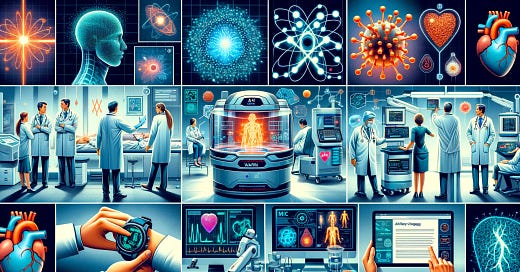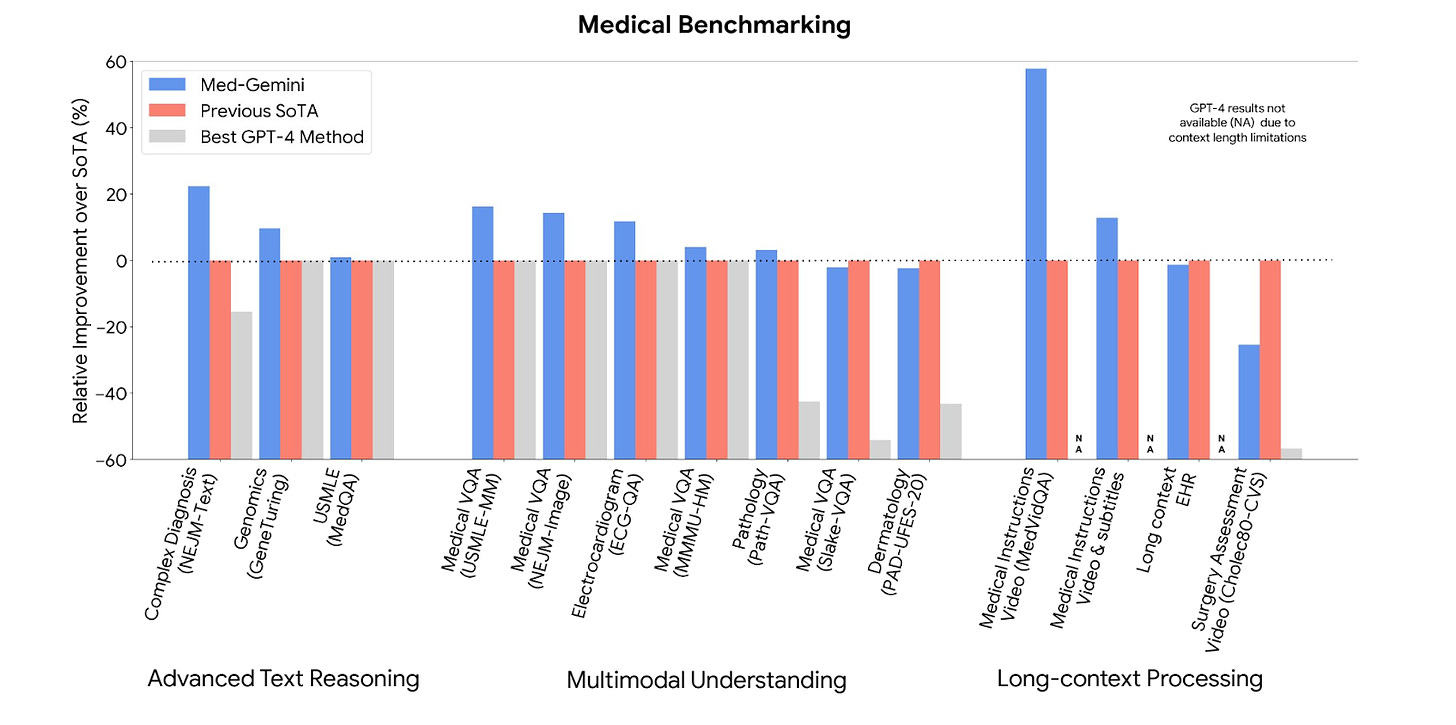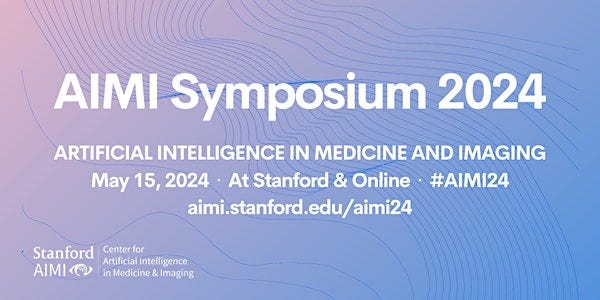🚀 This Week in Med AI: Unveiling Breakthroughs from AI-Driven Diagnostics to Gene Editing Innovations! 🧬
Updates on Artificial Intelligence & Emerging Technologies in Medicine 🤖🩺
“It is not the strongest of the species that survives, nor the most intelligent, but the one most responsive to change.” - Charles Darwin
Dear Med AI Enthusiast,
Welcome to The ‘Med AI’ Capsule weekly newsletter, your inside look at how artificial intelligence and emerging technologies are transforming medicine.⚕
Whether you're a medical professional 👩⚕️, a technology enthusiast 💻, or simply someone with a curious mind 🧠, The 'Med AI' Capsule is designed for you.
It helps you stay informed 📰 about the latest groundbreaking updates and offers insights into the rapidly evolving world 🌍 of artificial intelligence and emerging technologies in medicine.
Let the adventure begin! I'm thrilled to have you along for the ride. 🚀
In today’s capsule:
5 News Updates
4 Latest Research Papers
3 Industry Innovators
2 Upcoming Events
1 Knowledge Resource
Reading Time: 5-7 minutes
News Updates 📰
1. 🔬 Google's Med-Gemini Leads the Way in AI-Driven Medical Diagnostics
Google and DeepMind have developed Med-Gemini, an AI model that has reached 91.1% accuracy across various medical diagnostics benchmarks.
Why Important: This advancement underscores significant improvements in AI's ability to understand and process complex medical data, potentially transforming patient care and enhancing diagnostic processes.
Caution: Despite its success, the integration of Med-Gemini in clinical settings must be managed with stringent oversight to address privacy concerns and ensure the accuracy of its medical recommendations.
2. 🧬 Profluent Launches OpenCRISPR AI for Enabling Disease Cures
Profluent has introduced OpenCRISPR, a revolutionary AI gene editor generator designed to create unique CRISPR-like proteins aimed at curing previously untreatable diseases.
Why Important: Leveraging AI, Profluent's model generates millions of novel CRISPR-like proteins with its initial release, OpenCRISPR-1, providing a versatile and adaptable gene editing tool that promises significant advances in medical science and treatment options, expanding potential beyond natural limitations.
Caution: While the possibilities are vast, this technology raises various ethical and safety issues. Regulatory oversight and thorough testing are crucial to ensure that these innovations benefit humanity without unforeseen consequences.
3. 🤖 Luxembourg Researchers Develop AI to Predict Cardiac Arrhythmia Early
Scientists at the Luxembourg Centre for Systems Biomedicine have created a groundbreaking deep-learning model named WARN (Warning of Atrial fibRillatioN), which can predict atrial fibrillation—a common cardiac arrhythmia—approximately 30 minutes before it occurs.
Why Important: Atrial fibrillation, affecting millions worldwide and raising the risk of stroke and heart failure, can now be preemptively managed through an early warning system developed by the researchers, set to integrate into wearable devices for continuous, non-intrusive monitoring.
“Another interesting aspect is that our model has a high performance using only R-to-R intervals, basically just heart rate data, that can be acquired from easy-to-wear and affordable pulse signal recorders such as smartwatches.” - Dr Marino Gavidia
Caution: While promising, implementation will require careful consideration of ethical and privacy issues, as continuous monitoring and data collection through personal devices must prioritize patient confidentiality and data security.
4. ⚖️ MHRA Unveils AI Regulatory Strategy for Enhanced Healthcare and Innovation
The UK's Medicines and Healthcare products Regulatory Agency (MHRA) has released its strategic framework for artificial intelligence (AI) in healthcare, ensuring a balanced approach that promotes innovation while maintaining patient safety.
Why Important: The MHRA's strategy aims to facilitate the integration of AI technologies in medical devices and services. The strategy is built on principles of safety, transparency, fairness, and accountability, which are crucial for gaining public trust and ensuring effective healthcare delivery.
“I am pleased that MHRA has set out these principles, which will help ensure that AI continues to be used in a safe, secure, and transparent way across the health service.” - Victoria Atkins, Health and Social Care Secretary
Regulatory Highlights: The strategy focuses on AI as a Medical Device (AIaMD), proposing risk-proportionate regulations that consider the transformative potential of AI without compromising safety. The approach is expected to streamline processes, reduce administrative burdens, and expedite safe access to innovative solutions.
5. 🦠 Immunai Unveils AMICA, Pioneering AI in Immune System Profiling
Immunai, a New York-based healthcare tech firm, is transforming healthcare with its AMICA platform, described as "the world’s largest cell-level immune knowledge base," offering groundbreaking advancements in drug discovery and patient treatment, much like a "Google Map for our immune system."
Why Important: AMICA, standing for "Annotated Multiomic Immune Cell Atlas," integrates artificial intelligence with single-cell RNA sequencing to enable precise immune system profiling, aiding pharmaceutical companies and healthcare providers in understanding disease mechanisms and treatments, and enhancing the success rates of early-stage drug trials by evaluating optimal drug dosages and patient-specific treatment recommendations.
Caution: As with all AI-driven tools in medicine, the application of AMICA must be carefully regulated to ensure accuracy, privacy, and ethical use of patient data.
Latest Research Papers 🔬
González-Castro A, Leirós-Rodríguez R, Prada-García C, Benítez-Andrades JA. The Applications of Artificial Intelligence for Assessing Fall Risk: Systematic Review. J Med Internet Res. 2024 Apr 29;26:e54934. doi: 10.2196/54934. PMID: 38684088. - highlights AI's effectiveness in creating accurate predictive models for fall risk assessment, potentially reducing healthcare costs and improving public health.
Alis D, Tanyel T, Meltem E, Seker ME, Seker D, Karakaş HM, Karaarslan E, Öksüz İ. Choosing the right artificial intelligence solutions for your radiology department: key factors to consider. Diagn Interv Radiol. 2024 Apr 29. doi: 10.4274/dir.2024.232658. Epub ahead of print. PMID: 38682670. - offers a practical guide for radiology departments to select and integrate AI solutions for interpretative tasks, emphasizing key factors such as clinical relevance, performance validation, implementation, costs, and regulations.
Kim H, Jin HM, Jung YB, You SC. Patient-Friendly Discharge Summaries in Korea Based on ChatGPT: Software Development and Validation. J Korean Med Sci. 2024 Apr 29;39(16):e148. doi: 10.3346/jkms.2024.39.e148. PMID: 38685890. - develops and validates software, leveraging a large language model, to generate patient-friendly discharge summaries, demonstrating that Few-shot prompting methods produce acceptable summaries, indicating potential for patient-centered care.
Tao Y, Fang L, Qin G, Xu Y, Zhang S, Zhang X, Du S. Efficiency of endoscopic artificial intelligence in the diagnosis of early esophageal cancer. Thorac Cancer. 2024 Apr 29. doi: 10.1111/1759-7714.15261. Epub ahead of print. PMID: 38685604. - explores the efficacy of endoscopic artificial intelligence (AI) in diagnosing early esophageal cancer (EC) and its infiltration depth, demonstrating higher accuracy compared to novices and comparable to endoscopists, thereby indicating its potential for enhancing early intervention and personalized treatment plans.
Industry Innovators 👨🏭
Canvas Medical - Canvas Medical is a technology company that develops an electronic health record platform, aiming to reduce paperwork and streamline data management. Founded in 2015, it is deeply committed to advancing healthcare by building digital infrastructure for care delivery and fostering clinician-developer collaboration.
Corti - is an AI platform that enhances healthcare delivery by providing real-time decision support during patient encounters. Trusted globally, it’s backed by extensive research and used in various healthcare settings, including hospitals and emergency services.
Cleerly - Cleerly is a digital healthcare company that uses AI and CCTA imaging to precisely identify and define atherosclerosis, providing personalized treatment plans. Their technology enables earlier detection and improved management of heart disease, aiming to prevent heart attacks and improve clinical outcomes.
Upcoming Events 🧑💻
Knowledge Resource 📚
BrainX Talks podcast series: Conversation with Vivek Natarajan
This video is a part of the BrainX AI in Medicine Podcast series, which features leaders from the fields of AI and medicine discussing their groundbreaking research.
This episode features Vivek Natarajan, a Research Scientist at Google. He leads research at the intersection of large language models (LLMs) and biomedicine, and he has been instrumental in the development of AI systems like Med-PaLM and Med-PaLM 2, which have achieved passing and expert level scores on US Medical License exam questions.
In this episode, Vivek discusses his latest work on Med-PaLM M, a generalist biomedical AI system, and AMIE, an AI system that surpassed primary care physicians in a virtual examination format. His work has contributed to several regulated medical device products under clinical trials at Google.
Let’s wrap it up with a poll! 📊
Your feedback is crucial to me, as it helps me understand your interests and improve my offerings. I would appreciate it if you could take a few minutes to share your thoughts about what you've enjoyed and what you think I could do better - https://forms.gle/xpbpgVEyARWx6ZxN8
Stay tuned for our upcoming editions as we explore the latest breakthroughs and dive deep into the transformative power of artificial intelligence and emerging technologies, shaping a healthier future. 🚀
Warm regards,







